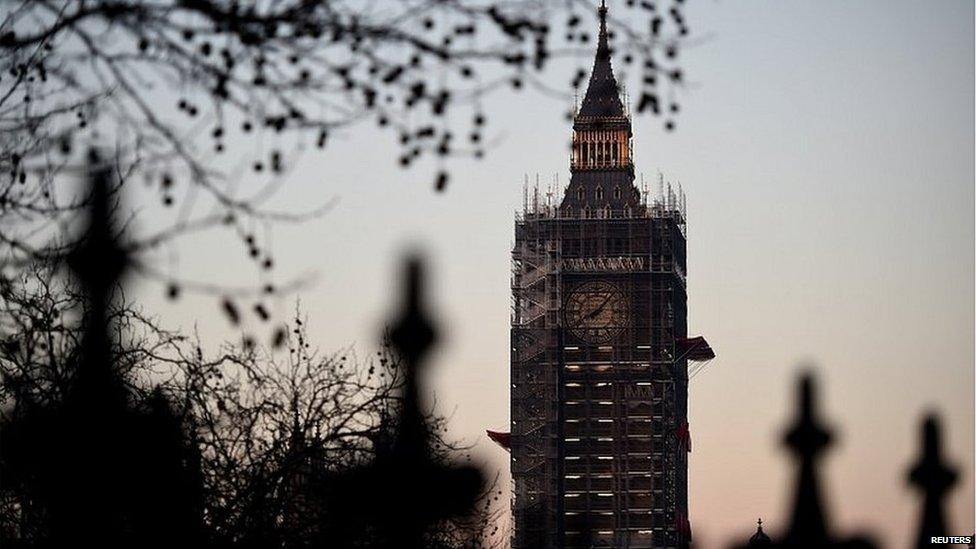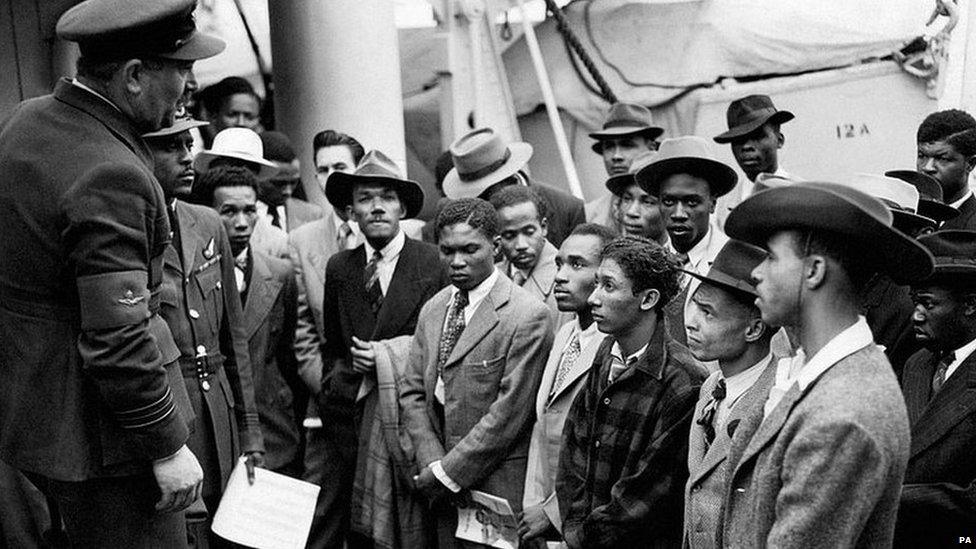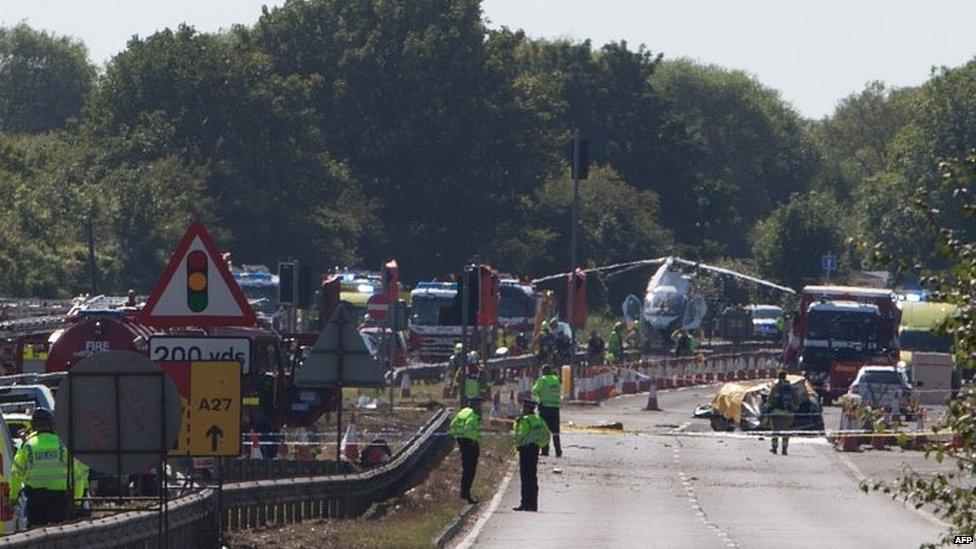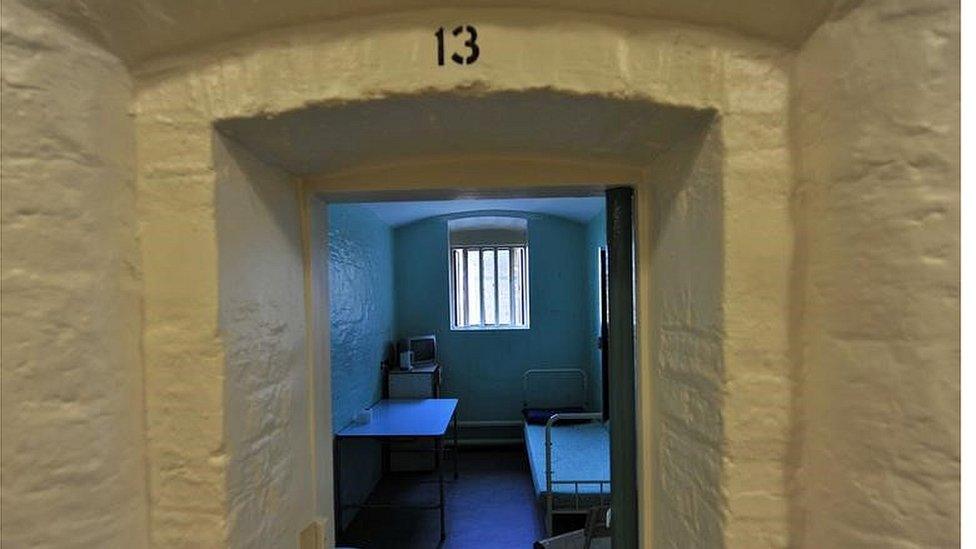The week ahead in Parliament
- Published

While the EU (Withdrawal) Bill is briefly in hibernation, the accumulation of amendments before its Report Stage consideration will bear watching.
Within hours of the end of committee consideration, a respectable number had appeared, mostly from the parties or the usual suspects - including Labour's Chris Leslie and the Conservative Dominic Grieve.
Hard core parliamentary and Brexit nerds should keep an eye out for the supplementary programme motion setting out the timings and how the Report Stage debate will be divided up into subject headings - I'm assuming there will be sections on devolution issues, ministerial powers and "anything else".
But the absence of that Bill will not mean there is no Brexit legislation for MPs to chew on in the week ahead;
The Taxation (Cross-Border) Trade Bill on Monday and the Trade Bill (Tuesday) are both important building blocks for post Brexit Britain - and they have the same generic issue as the Withdrawal Bill, which is that because they are designed to implement agreements that have not yet been reached, they contain very sweeping and general powers.
So expect more talk about Henry VIII, and the importance of parliamentary scrutiny - as well as a fair measure of cooperation by "soft Brexit" backbenchers across parties.
It's all process, so the biggest Brexit story event may well be whatever discussion there is of Michael Gove's proposals to reform farm subsidies, after Britain leaves the Common Agricultural Policy; it's hard to imagine that a public policy announcement of this magnitude not leading to a statement in the House, or at least an Urgent Question.
Watch out, too, for the next moves by a series of select committees on issues of concern to them.
The powerful alliance of committee chairs concerned about the funding of the NHS may swing into action, and if Labour are at all on the ball, they will be seeking an Education Committee confirmation hearing for Toby Young, after his controversial appointment to the board of the new university watchdog, the Office for Students.
Watch out for the Environmental Audit Committee Chair Mary Creagh's follow-up to its proposals for a 25p "latte levy" on disposable coffee cups. Already she has written to the Speaker to suggest Parliament should set an example by cutting the 650,000 disposable cups it uses each year.
All of next week's action takes place in the shadow of a government reshuffle, which might, or might not, be manifest by Friday.
The result could be some interesting dispatch box moments with some new arrivals fielding questions with minimal briefing and some ministers who are facing the chop having to cope with jibes from the Opposition or - probably equally unwelcome - expressions of sympathy. That's all assuming the prime minister doesn't conclude that a reshuffle is more trouble than it's worth.
Here's my rundown of the week ahead:
Monday 8 January

The 70th anniversary of the Windrush generation will be marked
The Commons launches into 2018 with Home Office Questions at 14.30 GMT, doubtless to be followed with any number of post-holiday Urgent Questions and Ministerial Statements.
These could cover everything from the strain on the NHS in England to the situation in Iran, to those Michael Gove plans for post Brexit farm subsidies, to the possible selling off of the Navy's assault ship, HMS Ocean (which of Plymouth MPs Johnny Mercer (C) and Luke Pollard (Lab) will get there first, I wonder?).
After these, MPs will move on the Second Reading of the Taxation (Cross-Border) Trade Bill, which will allow ministers to set up a post-Brexit customs system, to ensure that goods can move smoothly and safely in and out of the UK, and allow the UK to set and collect its own duty on goods coming into the country.
The powers will have to be fairly broad, because the structures they will set up will depend on the outcome of the EU negotiations.
Labour, the SNP and the Liberal Democrats have amendments down to deny the Bill a Second Reading; Labour point to a lack of a coherent plan for customs and tariffs post-Brexit, the SNP cite the Irish border issue and the Lib Dems reject the Bill because it assumes the UK will leave the EU Customs Union.
My Committee pick is the Communities and Local Government hearing on private rented housing, where the key issue is whether councils have sufficient powers to tackle rogue landlords. The committee is also using the session with academics and the homelessness charity, Shelter, for its pre-legislative scrutiny of the Government's draft Tenants Fees Bill, which would ban the imposition of letting fees on tenants.
In the Lords, beginning at 14.30 GMT, questions to ministers include the former Chairman of the Conservative 1922 Committee, Lord Spicer, asking about reporting to Parliament on Brexit; Lib Dem Baroness Floella Benjamin asks about commemorating the 70th anniversary of the arrival of the MV Empire Windrush carrying Caribbean people who had been encouraged to emigrate to the UK by the Government.
The Green Party peer Baroness Jones of Moulsecoomb will raise the establishment of an independent environmental enforcement agency before the UK leaves the EU, and the Lib Dem Lord Roberts of Llandudno will raise the arrangements for child refugees post-Brexit.
The main debate is on the Government's Industrial Strategy and the case for boosting earning power and productivity across the UK with investment in the skills, businesses and infrastructure of the future.
Tuesday 9 January:

Conservative MP Tim Loughton will speak up on behalf of the families of victims of the Shoreham air crash
The Commons opens, at 11.30 GMT, with Foreign Office Questions - followed, in all probability by more Ministerial Statements and Urgent Questions.
Then comes a Ten Minute Rule Bill from the Conservative Peter Aldous on Construction (Retention Deposit Schemes). He has a draft bill dealing with the issue of building contractors (including some local authorities) sitting on money owing to their sub-contractors, sometimes till they go bust. Various attempts to put voluntary arrangements in place have failed to bring an improvement.
The main legislating is on the Second Reading of the Trade Bill - which, taken together with Monday's Customs Bill - will give ministers the power to set a new post-Brexit trade policy so that the UK has a new system in place on the first day after Brexit.
The powers include allowing transition trade agreements that currently exist between the EU and other countries, and which Britain is party to through the EU; establishing the UK as a member of the Government Procurement Agreement, a key international arrangement which gives access to £1.3 trillion worth of government contracts and procurement opportunities in 47 countries; creating a new independent UK body, the Trade Remedies Authority, to defend UK businesses against unfair trade practices, and to ensure the Government has powers to gather and share trade information.
Once again, Labour, and the SNP have amendments down to deny it a Second Reading. Labour's is rather interestingly-worded, noting that Britain will need a new legal framework for post-Brexit trade agreements "whether or not the UK concludes a new long-term customs union with the EU."
This does not amount to staying in the existing CU, since the amendment goes on to talk about new trade deals that would not be possible if we did, but all the same it zeros in on a key issue. And there is also reference to the lack of proper parliamentary procedures to scrutinise what will be very important trade treaties. The SNP amendment explicitly says the bill should be blocked because it rules out remaining in the EU Single Market or the CU, with no assessment of the impact of that policy.
In Westminster Hall the opening debate. from 9.30 to 11.00 GMT, is on the effect of universal credit on the private rented sector. It will be led by the Lib Dem Work and Pensions shadow, Stephen Lloyd, who has spoken in the Commons about his concerns that the 1.5 million private sector rented tenants on Housing Benefit across the UK could, unless the government make it easy for landlords to receive direct payments from tenants on Universal Credit, be in danger of losing their homes if they fall behind with their payments.
He says private landlords can't afford not to receive rents for months on end, as councils and housing associations sometimes can, in emergency situations.
That is followed by a debate on Luton airport expansion at 11 GMT. The Conservative Bim Afolami says there is great concern from Hertfordshire residents about the proposed huge expansion of the airport. He plans to use this debate to address issues like infrastructure - there isn't much in a rural area, he says, and noise pollution which he says is high even with the current 16 million passengers using the airport.
With a government decision on Heathrow and other airport expansion expected at some point this year, this is the first in a number of debates on the issues around expanding various airports.
In the afternoon, the Labour MP Ian C. Lucas leads a debate on changes to the Independent Living Fund. This will focus on concerns about the Welsh Government's proposal to transfer administration of the Independent Living Fund for disabled people to local authorities.
At 16.00 GMT, local MP Tim Loughton has another in the series of debates he has led on different aspects of the Shoreham air show crash.
This one will centre on access to justice for families of the victims - the specific issue is families of victims not qualifying for exceptional circumstances legal aid at the Coroner's Inquest, and the broader point of family access to justice on equal terms in disasters like Shoreham or Hillsborough.
The Labour MP Dan Jarvis's Yorkshire devolution debate, at 16.30 GMT, picks up on the outcome of a referendum in South Yorkshire on proposals to create a Sheffield City Region authority, covering Barnsley Doncaster, and Rotherham - and perhaps ultimately extending into Chesterfield and North East Derbyshire.
This has been the subject of considerable controversy, with many Yorkshire MPs and councils arguing for an all-Yorkshire super council instead.
This would be a very large authority indeed - with a population greater than Scotland and twice that of Wales. Mr Jarvis says the referendum result (85% in favour of the All Yorkshire option in Doncaster and Barnsley) give him and his allies the mandate to tell ministers that the Sheffield plan does not have support and push them towards the all-Yorkshire alternative.
Helpfully the Business Secretary Greg Clark - who was in charge of devolution in England in his previous incarnation as Communities Secretary - has argued that devolved authorities should not be imposed from the top down.
My Committee picks are the Science and Technology hearing (at 9.30 GMT) on e-cigarettes - this is the traditional inquiry opener with experts and academics, and will focus on their relative harmfulness and the health effects on users. The meeting will also explore the role of e-cigarettes for people giving up smoking.
I expect rather harder-edged politics in the Public Administration and Constitutional Affairs Committee hearing (10.00 GMT) on what would happen if the current Parliamentary Boundary Review is ditched. The review, due to be completed in October, aims to reduce the number of MPs from 650 to 600 as well as equalising the size of constituencies.
But a Labour private members bill - which might well command a Commons majority - could order a new review based on keeping 650 MPs.
The Committee will hear from the Secretaries of all four Boundary Commissions (for England, Scotland, Wales and Northern Ireland) as well as from elections experts Professor Jane Green, Professor Ron Johnston, and Professor Roger Scully.
In the Lords, (at 14.30 GMT), the main debates are on the second readings of two relatively uncontroversial government bills; Firstly, the Secure Tenancies (Victims of Domestic Abuse) Bill -- this delivers the Conservative manifesto commitment to ensure that those who have a lifetime tenancy and flee domestic violence are able to secure a new lifetime tenancy automatically.
Second is the Laser Misuse (Vehicles) Bill - which will allow people who target transport operators with laser devices to be jailed for up to five years and removes the £2,500 cap on the fine offenders can face. The Bill provides specific protection for drivers of trains and buses, captains of boats and pilots of hovercraft, and will make it easier to prosecute offenders by removing the need to prove an intention to endanger a vehicle.
Wednesday 10 January

Mental health support in prisons will be highlighted by Labour's Harriet Harman
The Commons opens, at 11.30 GMT, with half an hour of questions to the Cabinet Office and Chancellor of the Duchy of Lancaster.
On previous occasions the now resigned First Secretary of State, Damian Green, led for the government; it is not clear whether he will be replaced, or whether the prime minister will scrap the post of First Secretary altogether.
The Chancellor of the Duchy is the Conservative Party Chairman Patrick McLoughlin, also widely tipped for the sack - so there may be more than the usual level of interest in an occasion that is generally treated as an appetiser for PMQs - which will follow at noon.
The day's Ten Minute Rule Bill is proposed by Labour's John Spellar, who goes in to bat for the live music scene with a bill to provide planning protection for its venues; where new housing is built nearby, he wants to establish that if there are concerns about noise from the venue, the new arrival should be required to stump up for any insulation or other mitigation measures.
He says there has been some sympathy from ministers, but that a clear change in the law is needed, rather than a change in guidelines.
The day's main debate will be on a Labour motion, on a subject to be announced.
In Westminster Hall the day opens, at 9.30 GMT, with a debate on mental health in prisons.
Harriet Harman, the chair of Parliament's Joint Committee on Human Rights, will highlight their recent inquiry, which found that a human rights-based approach can lead to better prevention of deaths in prison of people with mental health conditions.
Other subjects for debates include the Disability Confident scheme (14.30 GMT) and patient travel times for cancer treatment (16.00 GMT) - a subject raised by the former Lib Dem Leader, Tim Farron, in the last PMQs of 2017. He was concerned that when patients had to travel a long distance for treatment, it had a massive impact on the outcome. Finally (at 16.30 GMT) there's another airport-related debate on growth and noise mitigation at Gatwick Airport, led by the Conservative Tom Tugendhat.
My committee pick is the Business, Energy and Industrial Strategy Committee hearing on the government's energy price cap bill, which is aimed at protecting vulnerable customers by lowering fuel costs. The witnesses are Ofgem chief executive Dermot Nolan and a government minister.
In the Lords, at 15.00 GMT, the main event is the final Report Stage debate on the Data Protection Bill - where the key issues will be data controllers, the Information Commissioner, a data ethics advisory board., class action on breaches, and a Leveson 2 inquiry.
There is talk of a possible government concession on Baroness Hollins' amendment on Leveson 2 - the second phase of the Inquiry set up by David Cameron, into press ethics. If the concession doesn't appear, the issue may be forced to a vote and that might mean a government defeat.
The dinner break business is a regret motion from the Labour Peer, George Foulkes, on the transport policing aspects of the Scotland Act (Consequential Functions) Order.
Thursday 11 January

Tory MPs could use a Labour debate to warn about defence cuts
MPs open, at 9.30 GMT, with International Trade Questions, followed at 10.00 GMT by Women and Equalities Questions, and then the Commons Business Statement from the Leader of the House, Andrea Leadsom.
The main debate is on a backbench motion on defence from the Labour former Shadow Defence Secretary, Vernon Coaker. It calls for UK defence spending and service manpower to be maintained at at least current levels, without the loss of any significant military capabilities.
It has been quite a while since the last full-scale Commons debate on defence and the occasion should provide a rallying point for MPs concerned about the erosion of the armed forces - and in particular for increasingly vocal backbenchers like Jonny Mercer, who are openly threatening rebellion.
This replaces the planned debate on the Restoration and Renewal of the Palace of Westminster - the multi billion pound scheme to restore Parliament's iconic Victorian home; this has been postponed because many MPs did not want it held on a Thursday, and a new, prime-time debating slot is being sought.... the latest delay in actually holding a debate that has been promised since September 2016.
In Westminster Hall (1.30 pm) there's a debate on a report from the Environment, Food and Rural Affairs Committee, wittily entitled Forestry in England: Seeing the wood for the trees, external.
In the Lords, at 11.00 GMT, questions cover the UK's withdrawal from the London Fisheries Convention, additional funding to the NHS to prepare for winter, the import of poorer quality food produced to lower animal welfare standards from the US.
Then there's a topical short debate led by the Lib Dem, Tony Greaves, asking what the government is doing about the Chinese ban on imports of plastic and other waste - vast quantities of UK waste had been shipped to China, so the move has huge implications for waste recycling in Britain.
Then it's on to debates on subjects chosen by Crossbench peers; they should enjoy these while they have the chance - with the Brexit legislative load about to increase, future Thursdays are likely to be devoted to legislation, although it will tend to be the less controversial bills, where Committee Stage has been taken in Grand Committee.
First the social housing expert Lord Best leads a debate on the performance of the UK's major housebuilders, then the film director and children's rights campaigner Baroness Kidron has a debate on the role played by social media and online platforms as news and content publishers.
Neither House sits on Friday.
- Published31 December 2017